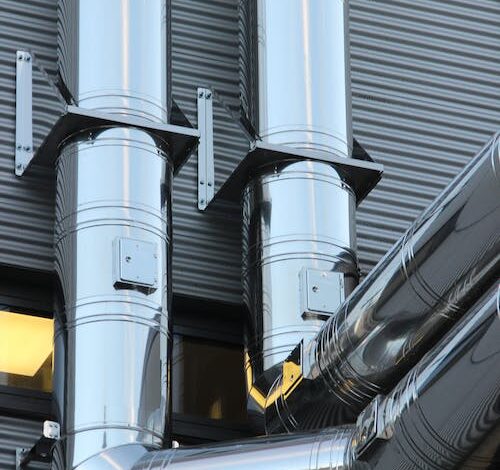The Ultimate Guide to Choosing the Right Boiler Steel for Maximum Efficiency
The Ultimate Guide to Choosing the Right Boiler Steel for Maximum Efficiency

Understanding the Importance of Choosing the Right Boiler Steel
Choosing the right boiler steelvirgamet.com is crucial for the overall efficiency of your industrial operations. Boiler steel is subjected to high temperatures and pressure, making it susceptible to corrosion, fatigue, and other forms of damage. By selecting the appropriate boiler steel, you can improve energy efficiency, reduce maintenance costs, and prolong the lifespan of your equipment.
One of the key factors to consider when choosing boiler steel is its ability to withstand high temperatures without losing its structural integrity. Different grades of boiler steel have varying temperature resistance, which is measured by their creep strength. Creep refers to the gradual deformation of the material under prolonged exposure to high temperatures. It is important to select a boiler steel with a high creep strength to ensure that it can withstand the operating conditions of your facility.
Another important consideration is corrosion resistance. Boiler steel is often exposed to corrosive environments, such as those found in power plants or chemical processing facilities. Corrosion can weaken the steel, leading to leaks and failures. Choosing a corrosion-resistant boiler steel can help prevent these issues and ensure the longevity of your equipment.
Additionally, the mechanical properties of boiler steel should be taken into account. These properties include tensile strength, yield strength, and impact resistance. The right combination of these properties is essential for withstanding the stresses and strains that boiler steel is subjected to during operation.
Factors to Consider When Selecting Boiler Steel
When selecting boiler steel, there are several factors that you should consider to ensure that it meets your specific requirements. These factors include:
- Operating temperature and pressure: Determine the maximum temperature and pressure that your boiler will be subjected to. This will help you choose a boiler steel with the appropriate temperature and pressure ratings.
- Corrosion resistance: Assess the level of corrosion that your boiler will be exposed to. Consider factors such as the type of fuel or chemicals used, as well as the presence of moisture or other corrosive elements.
- Mechanical properties: Evaluate the mechanical properties required for your specific application. Consider factors such as tensile strength, yield strength, and impact resistance.
- Weldability: If your boiler requires welding during fabrication or maintenance, it is important to choose a boiler steel that is easily weldable.
- Cost: Consider your budget and the overall cost-effectiveness of the boiler steel. While it is important to choose a high-quality material, it should also be economically viable.
By carefully considering these factors, you can select the right boiler steel that meets your specific needs and ensures maximum efficiency.
Different Types of Boiler Steel and Their Properties
When it comes to boiler steel, there are several different types available, each with its own unique properties. Some of the most common types of boiler steel include:
- Carbon steel: Carbon steel is a popular choice for boiler applications due to its affordability and good mechanical properties. However, it is not suitable for environments with high levels of corrosion.
- Alloy steel: Alloy steel contains additional elements, such as chromium, molybdenum, or nickel, to enhance its mechanical properties and corrosion resistance. Alloy steel is commonly used in high-temperature and high-pressure applications.
- Stainless steel: Stainless steel is known for its excellent corrosion resistance and high-temperature strength. It is often used in boilers where corrosion is a major concern.
- Duplex stainless steel: Duplex stainless steel offers a combination of high strength and corrosion resistance. It is particularly suitable for applications where both properties are important.
Each type of boiler steel has its own advantages and disadvantages, and the choice depends on the specific requirements of your application. Consulting with a knowledgeable supplier or metallurgist can help you determine the best type of boiler steel for your needs.
Common Boiler Steel Grades and Their Applications
Boiler steel is available in various grades, each with its own unique chemical composition and mechanical properties. Some of the most commonly used boiler steel grades include:
- ASTM A516 Grade 70: This grade is widely used in the construction of boilers and pressure vessels. It offers excellent tensile strength and good corrosion resistance.
- ASTM A387 Grade 11: This grade is suitable for high-temperature applications and offers good corrosion resistance. It is commonly used in power plants and petrochemical facilities.
- ASTM A204 Grade B: This grade is specifically designed for elevated temperature service and offers good mechanical properties and corrosion resistance.
- EN 10028-2 P355GH: This European standard grade is used for the construction of boilers and pressure vessels. It has good weldability and elevated temperature properties.
The choice of boiler steel grade depends on factors such as operating temperature, pressure, and corrosion resistance requirements. It is important to consult with a materials engineer or metallurgist to determine the most suitable grade for your specific application.
Testing and Certification of Boiler Steel
To ensure the quality and performance of boiler steel, it is important to rely on testing and certification. Boiler steel should undergo various tests to evaluate its mechanical properties, corrosion resistance, and other performance characteristics.
One of the most common tests for boiler steel is the tensile test, which measures the material’s strength and ductility. Other tests include impact testing, hardness testing, and corrosion testing.
In addition to testing, boiler steel should also meet certain industry standards and certifications. These certifications ensure that the steel meets specific quality and performance requirements. Some common certifications for boiler steel include ASME SA 516, EN 10028, and ASTM A387.
When choosing a supplier, it is important to ensure that they provide the necessary testing and certification documentation to guarantee the quality and performance of the boiler steel.
Best Practices for Maintaining Boiler Steel Efficiency
Choosing the right boiler steel is only the first step in ensuring maximum efficiency. Proper maintenance practices are essential for prolonging the lifespan and efficiency of your boiler steel.
Regular inspections are crucial for identifying any signs of corrosion, leaks, or other forms of damage. These inspections should include checking for any signs of pitting, scaling, or cracks. In addition, it is important to monitor the operating conditions, such as temperature and pressure, to ensure that they are within the recommended limits.
Regular cleaning and descaling of the boiler steel can help prevent the buildup of scale and corrosion. This can be achieved through chemical cleaning or mechanical methods, depending on the specific requirements of your boiler.
Furthermore, ensuring proper water treatment is essential for preventing corrosion and scaling. Water treatment should include measures such as pH control, oxygen scavenging, and the use of corrosion inhibitors.
By implementing these best practices, you can ensure that your boiler steel operates at maximum efficiency and remains in optimal condition for years to come.
Case Studies: Successful Implementation of the Right Boiler Steel
To illustrate the importance of selecting the right boiler steel, let’s look at a couple of case studies where the choice of boiler steel significantly impacted the efficiency and performance of industrial operations.
Case Study 1: Power Plant Boiler In a power plant, the boiler steel used in the construction of the boilers plays a critical role in overall efficiency. A power plant was experiencing frequent boiler failures due to corrosion and fatigue. After consulting with metallurgical experts, they decided to upgrade the boiler steel to a corrosion-resistant alloy steel. This resulted in improved corrosion resistance and longer boiler lifespan, leading to reduced downtime and increased energy efficiency.
Case Study 2: Chemical Processing Facility In a chemical processing facility, the boiler steel used in the production process was constantly exposed to corrosive chemicals. The facility was experiencing frequent leaks and failures, leading to costly repairs and downtime. After evaluating the corrosive environment and consulting with materials engineers, they switched to a duplex stainless steel for their boilers. This change significantly improved corrosion resistance and reduced maintenance costs, resulting in improved overall efficiency.
These case studies demonstrate the importance of selecting the right boiler steel for specific applications. By understanding the unique requirements of your operation and consulting with experts, you can make informed decisions that maximize efficiency and minimize maintenance costs.
Choosing the Right Supplier for Boiler Steel
Selecting the right supplier for your boiler steel is crucial for ensuring quality and performance. When choosing a supplier, consider the following factors:
- Experience and expertise: Look for a supplier with extensive experience in providing boiler steel for similar applications. They should have a deep understanding of the industry requirements and be able to provide expert advice.
- Quality and certifications: Ensure that the supplier provides high-quality boiler steel that meets industry standards and certifications. This includes providing the necessary testing and certification documentation.
- Range of products: Look for a supplier that offers a wide range of boiler steel grades and types. This allows you to choose the most suitable material for your specific needs.
- Customer support: Consider the level of customer support provided by the supplier. They should be responsive to your inquiries and provide timely assistance when needed.
- Price and delivery: Evaluate the supplier’s pricing and delivery options to ensure that they are competitive and can meet your project timeline.
By carefully evaluating these factors, you can choose a reliable supplier that delivers high-quality boiler steel for your specific requirements.
Conclusion: Achieving Maximum Efficiency with the Right Boiler Steel
Selecting the right boiler steel is essential for achieving maximum efficiency and performance in your industrial operations. By considering factors such as operating temperature and pressure, corrosion resistance, mechanical properties, and weldability, you can choose a boiler steel that meets your specific requirements.
It is important to consult with experts and rely on testing and certification to ensure the quality and performance of the boiler steel. Implementing best practices for maintenance and monitoring can further enhance the efficiency and lifespan of your boiler steel.
By learning from successful case studies and choosing a reliable supplier, you can make informed decisions that optimize the efficiency and performance of your industrial operations. So, start exploring the options available and take your industrial operations to the next level with the right boiler steel.



